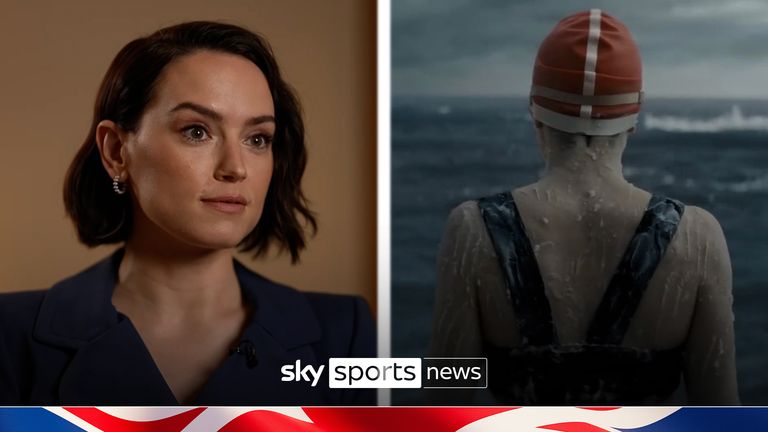[ad_1]
Actress Daisy Ridley talks to Sky Sports News’ Sam Boggon about playing Trudy Ederle in ‘Young Woman and the Sea’, Ederle was the first woman to swim across the English Channel almost 100 years ago; Ridley also talks about equality in women’s sport
By Sam Boggon
Last Updated: 17/07/24 5:05pm
On August 6, 1926, American swimmer Gertrude ‘Trudy’ Ederle took on an unthinkable challenge that would change the landscape of women’s sport forever.
Trudy started swimming competitively as a teenager becoming the youngest world record holder in the freestyle event before rising through the US ranks to qualify for the 1924 Olympics in Paris.
She won three medals at the Games including gold in the 4x100m freestyle relay before attempting to make history and become the first woman to swim the English Channel.

Gertrude ‘Trudy’ Ederle pictured before her attempt at swimming the English Channel
After being pulled out of the water during her first attempt, Trudy changed her coach and trained with Englishman Bill Burgess, one of five men to successfully swim the Channel at the time.
Trudy made sporting history a year later on her second attempt completing the swim in a time of 14 hours and 31 minutes, breaking the men’s record by almost two hours in a groundbreaking sporting moment.
New York City honoured her achievement in August 1926 with their first ticker-tape parade for a woman. It was the biggest parade for an athlete in New York as over two million people came out to cheer her success.
Now her story is being brought back to life in ‘Young Woman and the Sea’, produced by Jerry Bruckheimer with actress Daisy Ridley playing the role of Trudy in a powerful film that showcases overcoming challenges and prejudice to achieve something remarkable.
“A lot of women have been lost to history so being able to play one of those women is wonderful,” Ridley told Sky Sports News, as the Star Wars actress described how much she enjoyed the role of revealing Trudy’s story to the world.
“There is a wonderful message in there because we are honouring someone who is real and did something that she was told she couldn’t do.”

‘Young Woman and the Sea’ tells the extraordinary story of Gertrude ‘Trudy’ Ederle, the first ever woman to swim the English Channel available now on Disney+
Ridley herself only became aware of the story behind the film when the script was introduced to her based on Glenn Stout’s book and with the film now available to watch on Disney+, she told Sky Sports News of her disbelief that she and her colleagues had not heard of her before.
“People don’t know about her now and it was only 100 years ago which seems just bonkers.
“What she did was so monumental and at the time that she did it in, she probably changed women’s sport in a way that she could never have imagined.”

Daisy Ridley stars as Trudy Ederle in Disney’s ‘Young Woman and the Sea’
Ridley hopes that Trudy’s inspirational sporting story can positively impact society again and be a force of good for young people from any background to overcome adversity and follow their dreams.
“She did something women were fundamentally told they couldn’t do and the psychological barriers she broke when she did it allowed other people to think that it was possible,” Ridley said.
“Hopefully this film inspires everyone. If you’ve been told you can’t do it, if you’ve been told no, if you feel like your dream is unattainable but you want to try, just try.”

Gertrude Ederle enters the water with body greased and wearing goggles for the start of her record-breaking swim across the English Channel
With the Paris Olympics later this month, we will see a 50-50 split in male and female athletes for the first time in Olympic history which Ridley believes is a sign that we are moving in the right direction with gender equality in sport.
“We still have a long way to go in terms of equity in sport but we are getting there and with the Lionesses’ success in the past couple of years that’s started such a big conversation,” she said.
“The Olympics having 50-50 split is amazing and the fact is people love sport full stop so there should be room for everybody in that.”

Gertrude ‘Trudy’ Ederle during her attempt to become the first woman to swim the Channel
When Trudy faced struggles during her swimming career, she relied on the support of her sister Margaret [Meg] who initially got her into the sport and encouraged her to try longer distances before the Channel swim.
Ridley draws on this family bond as one of the most important themes in the story, allowing her to believe that she could achieve her dreams when women were seen as not physically capable of competing in male-dominated sports.
“When Tilda – who plays Meg – decides to get in the sea and race Trudy to keep up her spirits, there are such beautiful individual moments that people respond to,” she said.
“There was just such a support system around her and it is important to honour the people who helped her do it.”
Trudy showed perseverance and broke barriers after being told she was not strong enough to swim the Channel as she faced obstacles ahead of her second attempt, with the public perception that no woman could succeed where many men had failed.
Ridley believes this is a testament to Trudy’s resilience and spirit as she would not be discouraged despite everyone saying she couldn’t do it.
“When she attempts the swim for the second time she knew she was able to do it and that was what she wanted to do,” Ridley said.
“There were still going to be hurdles to overcome but that was her goal and she was going to reach it or die trying.”

Gertrude ‘Trudy’ Ederle became known by the press as ‘Queen of the Waves’ following her successful English Channel swim
After her historic swim, Trudy went on to star in movies and perform in vaudeville theatre shows before seriously injuring her back forcing her to retire from competitive swimming.
She suffered permanent hearing damage from her Channel swim but continued to inspire as she started teaching deaf children how to swim in New York City and shared her love of the sport with others who faced similar difficulties.
[ad_2]
Source link





